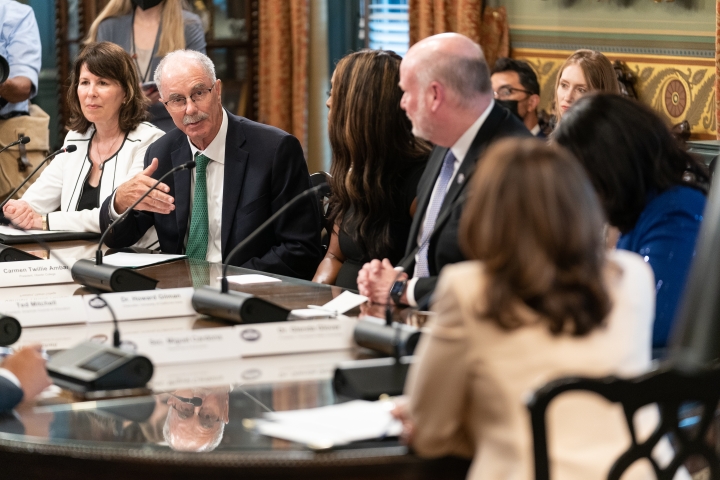President Philip J. Hanlon ’77 met at the White House today with Vice President Kamala Harris and seven other university presidents to talk about their concerns about reproductive rights and the challenges students are facing following the recent U.S. Supreme Court decision in Dobbs v. Jackson Women’s Health Organization that struck down Roe v. Wade, which for almost 50 years protected the right to abortion.
In the roundtable discussion with higher education presidents and chancellors, Harris said most of the people who will be affected by the decision are in their 20s.
“Women in college are uniquely impacted by restrictions on reproductive rights,” said Harris, noting the higher incidence of sexual violence among women on college campuses, and the academic and work responsibilities that “will certainly make it almost impossible” for students to leave school or afford to travel to access reproductive health care.
Harris lauded the “extraordinary work” colleges and universities are doing to protect students’ access to care in the wake of the court’s ruling, such as instituting flexible attendance and leave policies, creating emergency funds for students, and clarifying confidentiality and privacy policies for campus health services.
“There is good work happening here, and I really look forward to the conversation that we will have with these leaders, especially during these trying times,” she said.
Also at the meeting were the presidents of the University of California-Irvine, Gallaudet University, Howard University, City University of New York, Oberlin College, Reed College, and Tennessee State University, as well as U.S. Secretary of Education Miguel Cardona, and president of the American Council on Education Ted Mitchell.
“I want to thank Vice President Harris for convening this important discussion. The Dobbs decision will have profound public health consequences and has the potential to exacerbate racial and socioeconomic health disparities and put sexual violence survivors further at risk,” President Hanlon told the gathered leaders, as each of the leaders was invited to make an opening statement.
“As such, the decision is deeply distressing to many students, faculty, and staff at Dartmouth, as well as many members of the surrounding community, who have expressed themselves through statements and protests.”
“Dartmouth will continue its unwavering dedication to reproductive health care, autonomy and well-being for every member of our community, and we will continue to offer insurance coverage to our students and employees that supports reproductive health, in compliance with federal and state law. And the Geisel School of Medicine at Dartmouth will continue its deep commitment, through its research and educational programs, to reproductive rights for all, including childbearing decisions, maternal health and their effect on families,” he said. “We strongly support the reproductive rights of our community members.”
Harris has visited Florida, Pennsylvania, New Jersey, North Carolina, Virginia, Indiana, and Massachusetts to meet with state legislators about protecting reproductive rights, according to the White House website.
She has also convened legislators from Montana, Indiana, Florida, South Dakota, and Nebraska in Washington D.C., as well as health care providers, constitutional law experts, faith leaders, state attorneys general, disability rights leaders, and advocates over the last three months.
Read the official White House release on the event.
